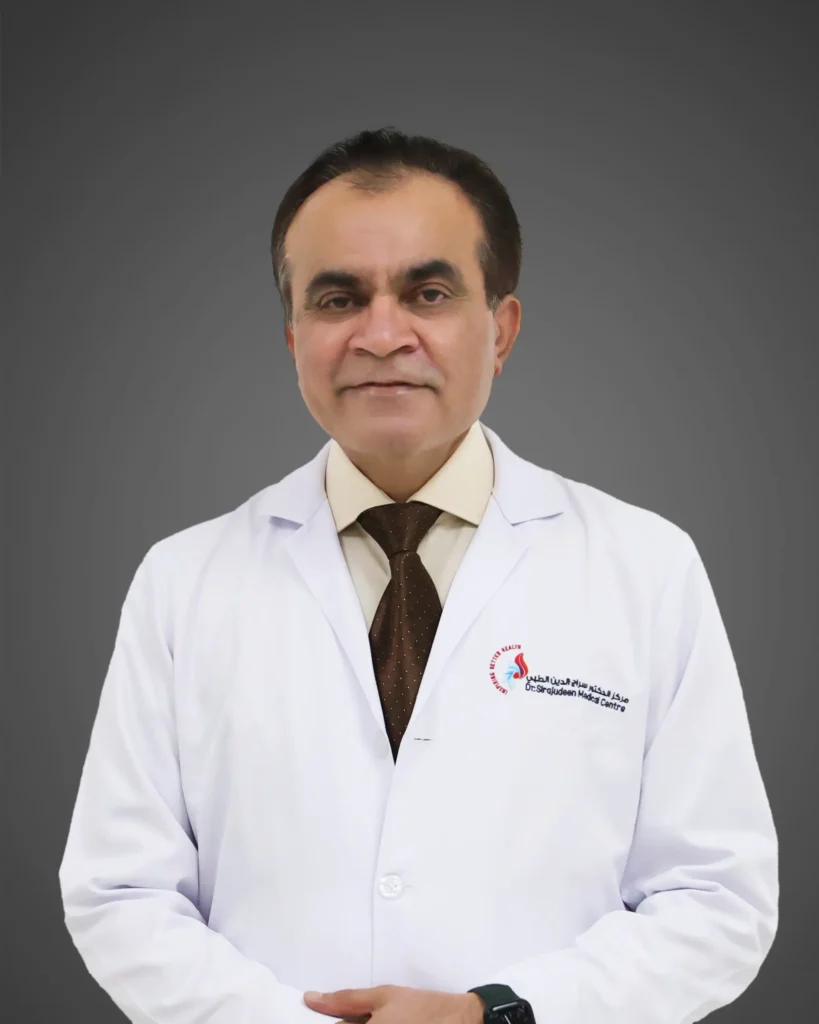Pigmentation Treatment in Dubai, UAE
Let our dermatologists handle your pigmentation issues with expert care. Visit Dr. Sirajudeen Medical Centre in Karama, where we provide treatments with proven results. Our treatments focus on healing dark spots, sun damage, and melasma.
Expert Pigmentation Treatment at Dr. Sirajudeen Medical Centre

Skin pigmentation means the amount of melanin your cells produce, which determines the color of your skin. When these cells get damaged, your skin color is also affected, and you may notice patches of light skin or dark skin spots (known as melasma). If you are looking for the best treatment for melasma on the face or pigmentation removal, you have come to the right place.
At Dr. Sirajudeen Medical Centre in Dubai, we specialize in providing complete care and treatment for pigmentation issues. Our expert team understands your skin conditions, ensuring that every treatment is tailored to your specific concerns to deliver lasting results. The price for pigmentation laser treatment price depending on the extent of the area being treated, but we offer competitive rates to ensure you receive the best care possible.
What Causes Pigmentation?
Understanding Uneven Skin Tone
Pigmentation is defined as the coloring of your skin, which results from melanin in your body. Melanin is produced by melanocyte cells, which help protect your skin from harmful factors like UV rays. Our skin pigmentation treatment is designed to reduce the overproduction of melanin and also includes solutions for skin disorders like albinism and vitiligo. We also provide clear information regarding the skin pigmentation cost, ensuring transparency and helping you plan your treatment with confidence.
Understanding the Difference: Pigmentation vs. Hyperpigmentation
- Pigmentation: Pigmentation is the normal color of your skin, which is based on the amount of melanin the cells in your body produce. When there is an imbalance in skin pigmentation, because of too much or too little melanin production, it can change the color of certain areas of your body.
- Hyperpigmentation: Hyperpigmentation is another type of pigmentation disorder that causes some areas of the skin to become dark. Hyperpigmentation treatment is provided when there’s too much accumulation of melanin, which can be caused by factors like sun exposure, hormonal changes, and skin damage.

Understanding the Various Types of Pigmentation
Hypopigmentation
Hypopigmentation happens when your skin loses its pigment, which can lead to light patches on your body. This is because the melanocyte cells are damaged or have stopped functioning due to reasons like infections, burns, or trauma/injury to your skin. There are two types of hypopigmentation, which are vitiligo and albinism.
Vitiligo
Vitiligo is an autoimmune disorder that happens when your body damages the cells (melanocytes) that produce melanin. When the cells do not produce enough melanin, light or white patches start occurring anywhere in your body. These affected areas of your skin become sensitive to sunlight.
Albinism
Unlike vitiligo, albinism is a genetic disorder that happens when your body prevents melanin production. This causes pale hair, and eyes, and also makes your entire skin sensitive to UV rays. Our skin discoloration treatment focuses on managing albinism conditions to protect your sensitive skin.
Get to know about our expert Dermatology Doctor
Dr. Chandar Jairamani has competed his MBBS from Karachi University in 1991 and MCPS from College of Physicians and Surgeons in 2000 with more than 22 years of experience. He has vast experience in treating patients with all types of skin ailments, such as Acne, Pigmentation disorders, Skin tags, Dermatitis, Eczema, Fungal, Viral & Bacteria infections, Hair loss (Alopecia), Disease of the nails, Herpes, Hives (Urticaria), Pre-cancerous skin growths (Actinic keratoses), Psoriasis, Rosacea and warts, to name a few.

Dr. Chandar Jairamani
Schedule your Pigmentation Treatment in Karama, Dubai today!

Essential Tips for Pigmentation Treatment and Personal Care
Visit a dermatologist
Before you start any self-treatment for pigmentation issues, it is important to seek medical advice from a professional. At Dr. Sirajudeen Medical Centre, our dermatologists will check the severity of your pigmentation and then provide solutions to help you manage these problems.
Sun protection
Using the right type of sunscreen with an SPF of 30 or higher is needed when you have pigmentation disorders. Sun exposure can make the pigmentation much worse and your treatment progress will also start to reduce. Applying sunscreen and wearing protective clothing can help prevent further damage.
Skincare
When you have vitiligo or albinism, it is important to follow a gentle skincare routine. Your skin becomes sensitive to harsh chemicals in the skin care products, that’s why you need to choose the right products that do not cause any further damage to your skin.
Hydration and nutrition
It is important to stay hydrated to keep your skin healthy if you already have skin disorders like hypopigmentation. Maintaining a diet that is rich in antioxidants, vitamin C, and omega-3 can help you have healthy skin and prevent further pigmentation issues.
Why We’re Your Best Choice for Pigmentation Treatment

Expert Dermatologists

Personalized Treatment Plans

Comprehensive Care

Proven Results
Request an Appointment
FAQ
Your questions and our honest answers!
You may need pigmentation treatment if you notice uneven skin tone, dark spots, white patches in certain areas of your body, or sun damage that doesn’t recover for a long time.
Yes. Our pigmentation treatments are safe because they are provided by highly skilled professionals with advanced technologies and methods that are based on the patient’s skin type.
To maintain the results of your skin pigmentation treatment, use sunscreen daily, follow a gentle skincare routine, and avoid too much sun exposure. Use specific products or follow-up treatments as per our dermatologist’s recommendation.
Before you start your treatment for skin pigmentation, it is important that you inform your dermatologist about any medications that you are currently taking to achieve the best possible results.
Almost all skin types can benefit from our pigmentation treatments, including those with light or dark skin tones. This is because we customize treatments based on the skin type and sensitivity of each patient.
